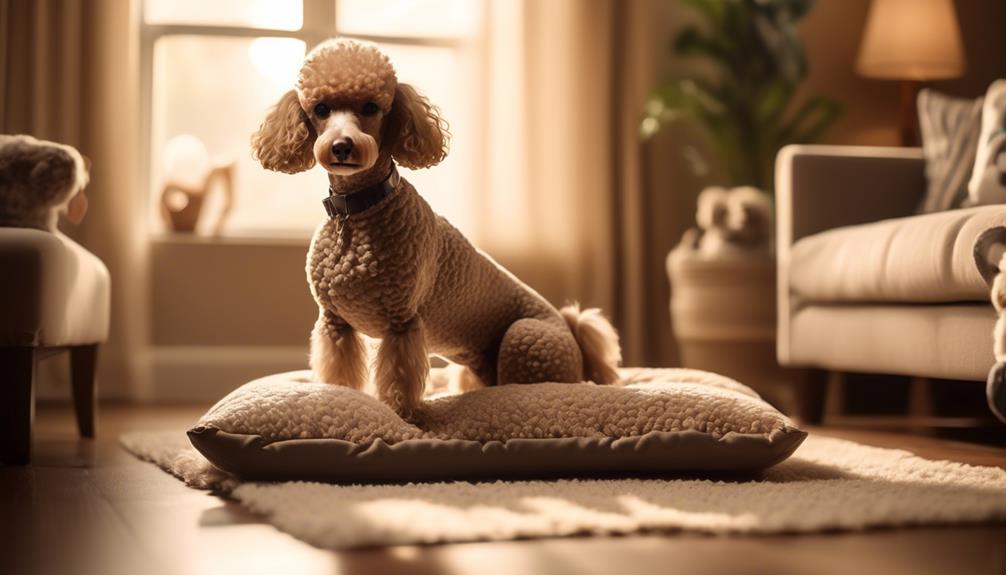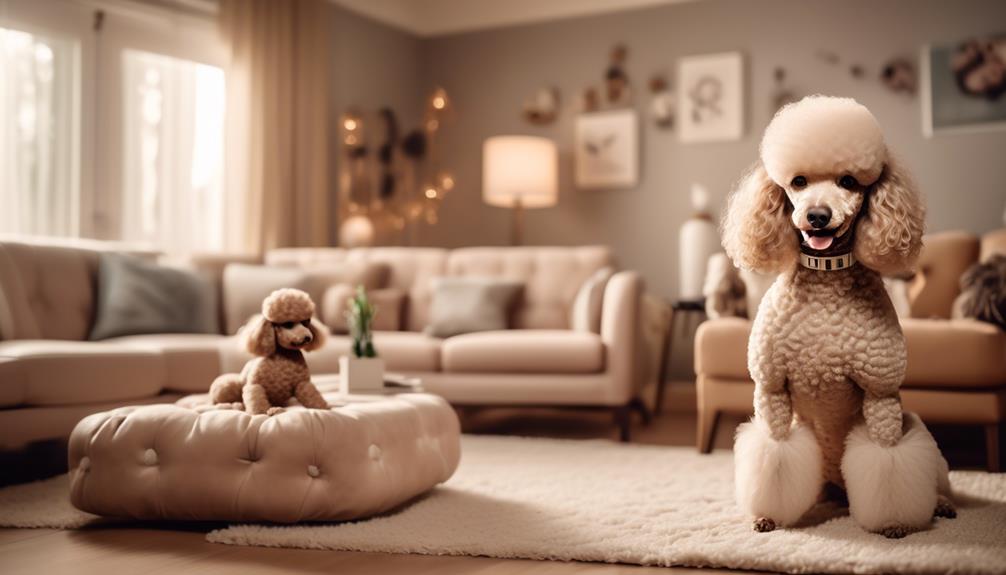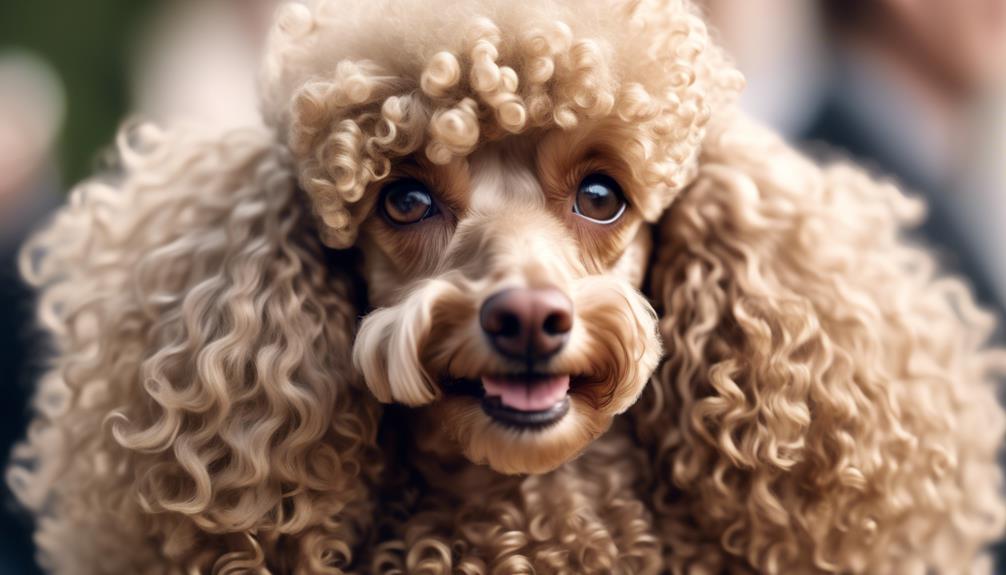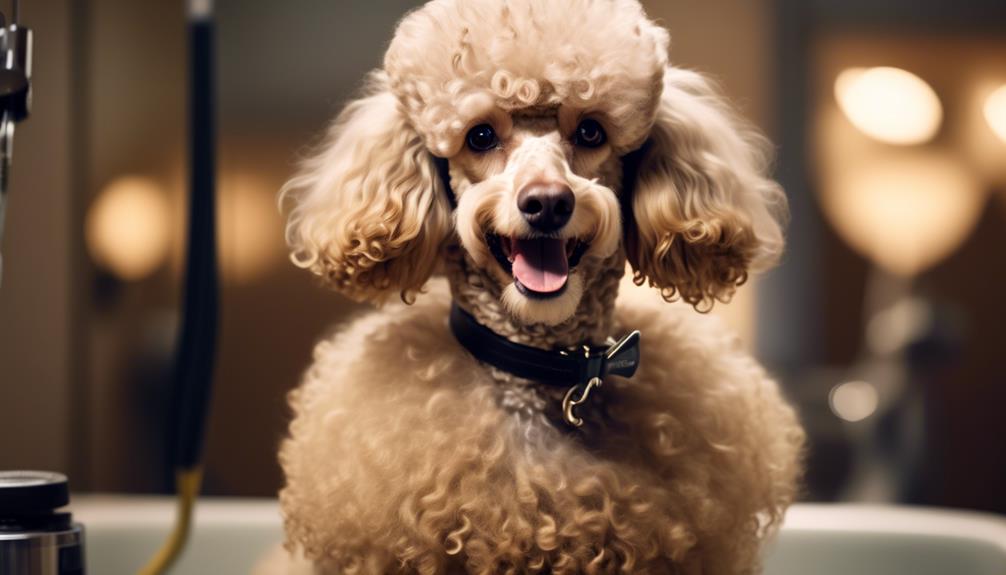When Is a Poodle the Right Choice for Allergy Sufferers?

Poodles are often a good choice for allergy sufferers. This is because they have minimal shedding and a hypoallergenic coat. These characteristics can help minimize allergic reactions.
Key Takeaways
- Poodles are known for their hypoallergenic qualities due to their low shedding and production of less dander compared to other breeds.
- Poodles' curly or wavy coats help to trap dander and prevent it from spreading, making them less likely to cause allergic reactions in people with sensitivities to pet dander.
- Different coat types require specific grooming techniques to maintain their hypoallergenic qualities, such as regular professional grooming for curly coats and more frequent brushing for wavy coats.
- Regular grooming and veterinary care are essential to keep a Poodle's coat hypoallergenic and address any health issues that may affect shedding and allergen levels.
Poodle Coat Characteristics
Poodle coat characteristics include a curly texture that contributes to their low shedding and hypoallergenic qualities. Poodles are known as one of the most hypoallergenic dog breeds available. This is because their curly coats trap loose hair and dander, preventing it from becoming airborne and causing allergic reactions. Unlike other breeds that shed profusely, poodles shed less, making them a great choice for individuals with allergies.
The hypoallergenic nature of poodles is further enhanced by their ability to produce fewer allergens. Allergens are substances that cause allergic reactions in sensitive individuals, and they're often found in pet dander. Poodles have minimal dander compared to other breeds, making them less likely to trigger allergies. This is especially important for people who suffer from allergies but still desire the companionship of a dog.
Even poodle mixes, such as labradoodles and golden-doodles, inherit these coat characteristics from their poodle lineage. These mixes also shed very little, making them suitable options for individuals with allergies. However, it's important to note that the size of the poodle can affect shedding. Larger poodles may shed more than smaller ones, so individuals with severe allergies might prefer smaller poodle varieties.
To maintain the hypoallergenic qualities of a poodle's coat, proper grooming and care are essential. Regular brushing and professional grooming help remove loose hair and prevent matting, ensuring that the coat remains hypoallergenic. By following these grooming practices, individuals with allergies can enjoy the company of a poodle without the worry of triggering allergic reactions.
Factors to Consider for Allergy Sufferers

When considering a dog breed for allergy sufferers, there are several important factors to take into account. One of the main considerations is the shedding of the dog's coat. Poodles, known for their hypoallergenic qualities, shed less compared to other breeds. However, it's important to note that no dog breed is entirely hypoallergenic, and individual reactions can vary.
Proper care for a Poodle's coat is essential in minimizing loose hair and allergens. Regular brushing and bathing are necessary to maintain the hypoallergenic qualities of the breed. By keeping the coat clean and well-maintained, allergy sufferers can reduce the chances of experiencing an allergic reaction.
Additionally, regular veterinary checkups are important for allergy sufferers considering a Poodle. These checkups help prevent health problems that can contribute to increased shedding and allergic reactions. It's also important to consider grooming and cost considerations when choosing a Poodle as a pet. Regular grooming is necessary to maintain the hypoallergenic qualities of the coat, which may require additional time and expense.
How Poodles Minimize Allergic Reactions

To minimize allergic reactions, Poodles employ various factors that contribute to their hypoallergenic qualities. These factors include:
- Low shedding: Poodles shed less compared to other breeds, which reduces the amount of dander and hair that can trigger allergic reactions. This is due to their unique coat characteristics, including having a single coat, a longer hair growth cycle, and a curly coat that traps loose hair.
- Proper grooming: Regular grooming is essential to maintaining a Poodle's hypoallergenic qualities. This includes regular brushing to remove loose hair and prevent matting, using a canine-formulated shampoo to minimize dander, and professional grooming to keep the coat clean and free from allergens.
- Overall health care: A Poodle's overall health plays a role in minimizing allergic reactions. Regular veterinary checkups can help prevent health problems that lead to increased shedding, such as parasitic infestations, skin infections, and hormonal disorders. A balanced diet and proper nutrition also contribute to a healthy coat and reduce allergens.
Proper Care and Grooming for Poodles

With the understanding of how Poodles minimize allergic reactions, it's crucial to discuss the proper care and grooming techniques that help maintain their hypoallergenic qualities.
Regular grooming is essential for poodles to prevent shedding and minimize the presence of dander, which is a common trigger for allergies. Brushing your poodle's coat regularly helps remove loose hair and prevents matting, which can trap allergens. Additionally, using a canine-formulated shampoo during bathing helps maintain the health of their coat while minimizing the risk of allergic reactions.
Professional grooming is also necessary to maintain the proper length of a poodle's coat and prevent tangles. Groomers have the expertise to trim the coat in a way that minimizes shedding while maintaining the hypoallergenic qualities.
It's important to note that poodles require regular veterinary checkups to prevent any underlying health issues that can lead to increased shedding. A balanced diet with the right vitamins and minerals is also crucial for maintaining a healthy coat in poodles.
Other Hypoallergenic Dog Breeds

Poodles aren't the only hypoallergenic dog breed available for allergy sufferers. There are several other breeds that are also known for shedding less and producing less dander, making them great choices for people with allergies.
Here are three other hypoallergenic dog breeds to consider:
- Bichon Frise: These small, fluffy dogs have a curly coat that doesn't shed much. Their hair grows continuously and needs regular grooming to prevent matting. Bichon Frises are friendly, affectionate, and make great companions for allergy sufferers.
- Portuguese Water Dog: Originally bred for fishing, these dogs have a waterproof coat that doesn't shed much. They require regular brushing and occasional grooming to keep their coat healthy. Portuguese Water Dogs are intelligent, active, and excel in water-related activities.
- Maltese: Known for their long, silky hair, Maltese dogs shed very little and are often considered hypoallergenic. They require regular grooming to prevent tangles and matting. Maltese dogs are gentle, playful, and make wonderful lap dogs.
While poodles are a popular choice for allergy sufferers, it's important to remember that there are other breeds that can also be suitable options. It's always recommended to spend time with different breeds to see how you react to them before making a decision.
Tips for Managing Allergies With a Poodle

Managing allergies when living with a Poodle requires a combination of proper grooming, regular veterinary care, and implementing allergy management strategies.
Poodles are often chosen by people with dog allergies due to their hypoallergenic qualities and low shedding. To reduce the number of allergens in your home, it's important to bathe your Poodle frequently using a canine-formulated shampoo. This helps to remove any allergens that may be present on their coat.
Regular grooming, including brushing and professional grooming, is also essential in managing allergies with a Poodle. These practices help to prevent matting and ensure that loose hairs are removed, reducing the amount of allergens in the environment.
Additionally, it's important to schedule regular veterinary checkups for your Poodle. Addressing any health concerns that may contribute to increased shedding or allergies can help in managing allergies effectively.
While Poodles are often touted as hypoallergenic, it's important to manage expectations and understand that no dog breed is entirely allergen-free. Therefore, in addition to grooming and veterinary care, it may be necessary to limit physical contact, use HEPA filters, vacuum regularly, and consider allergy medication or shots for frequent allergy attacks.
Final Thoughts on Choosing a Poodle for Allergy Sufferers

To conclude, when considering a Poodle as a suitable option for allergy sufferers, it's crucial to understand their hypoallergenic qualities and take necessary steps for proper grooming and veterinary care. Poodles are known for being a low-shedding breed and producing less dander compared to other breeds, making them a great choice for individuals with allergies. However, it's important to note that no dog breed is completely hypoallergenic, and some people with severe allergies may still experience allergic reactions to Poodles.
Here are some final thoughts to keep in mind when choosing a Poodle for allergy sufferers:
- Consider different coat types: Poodles come in various coat types, such as curly, wavy, and corded. Each type requires different grooming techniques to maintain their hypoallergenic qualities and minimize shedding.
- Regular grooming is essential: To keep a Poodle's coat hypoallergenic, regular brushing and grooming are necessary. This helps to remove any loose hair and prevent matting, reducing the amount of dander that can potentially trigger allergies.
- Veterinary care is important: Regular veterinary checkups are vital for ensuring the overall health of your Poodle. Health issues, such as skin allergies or infections, can lead to increased shedding. By addressing these issues promptly, you can help keep your Poodle's coat in optimal condition.
Frequently Asked Questions
Are Poodles OK for Allergies?
Poodles are often considered a good choice for allergy sufferers due to their hypoallergenic qualities. Regular grooming, including brushing and professional trims, is important to maintain their low-shedding coat and minimize allergies.
What Is the Most Hypoallergenic Poodle?
The most hypoallergenic poodle varies based on size, as larger poodles tend to shed more. Regular grooming, proper coat care, and a balanced diet are essential for maintaining their low-shedding qualities and reducing allergens.
Are Poodles More Hypoallergenic Than Doodles?
Poodles are often considered more hypoallergenic than doodles due to their low shedding and minimal dander. Regular grooming, including brushing and bathing, is essential for maintaining their hypoallergenic qualities and managing allergies.
Which Breed Would Be a Good Choice for Someone With Allergies?
Poodles are a great choice for allergy sufferers due to their minimal shedding and reduced allergen production. Regular grooming and veterinary checkups can help maintain their hypoallergenic qualities. Poodle mixes, like labradoodles and golden-doodles, also tend to shed very little.









